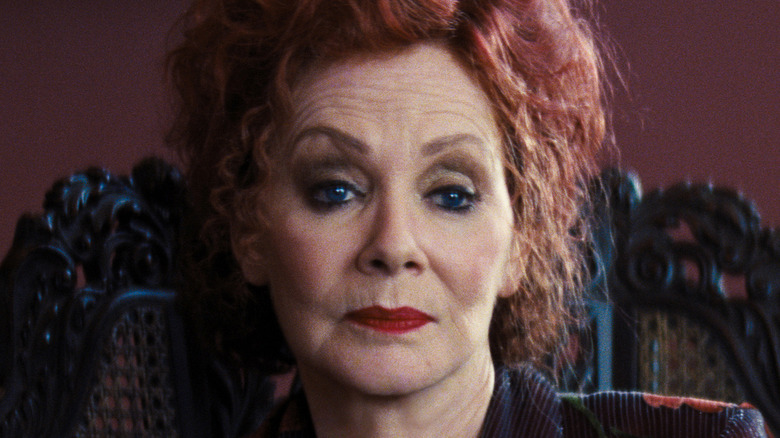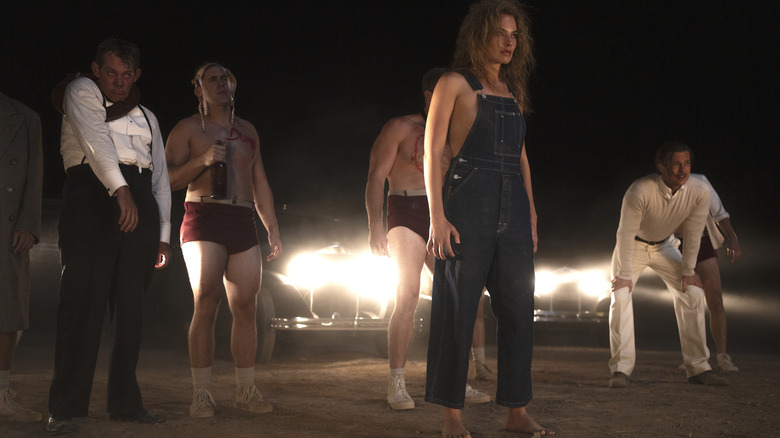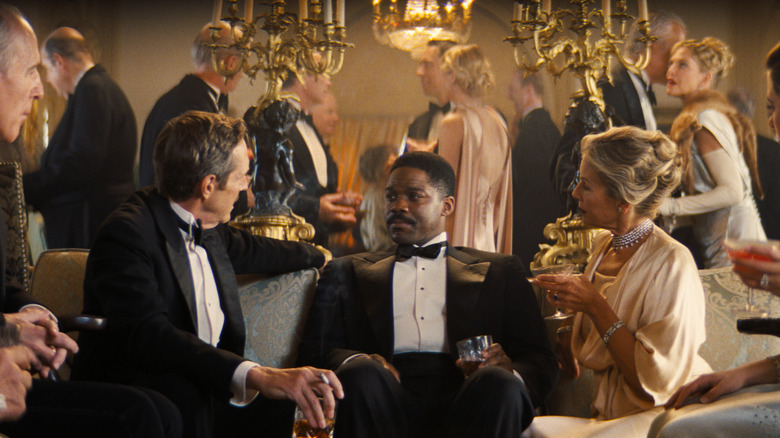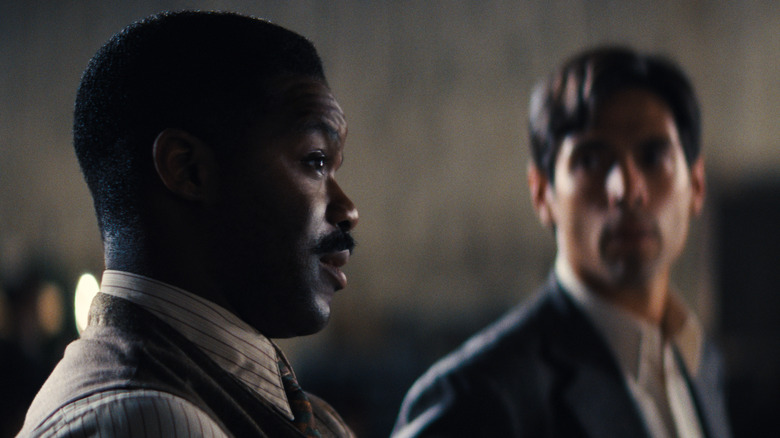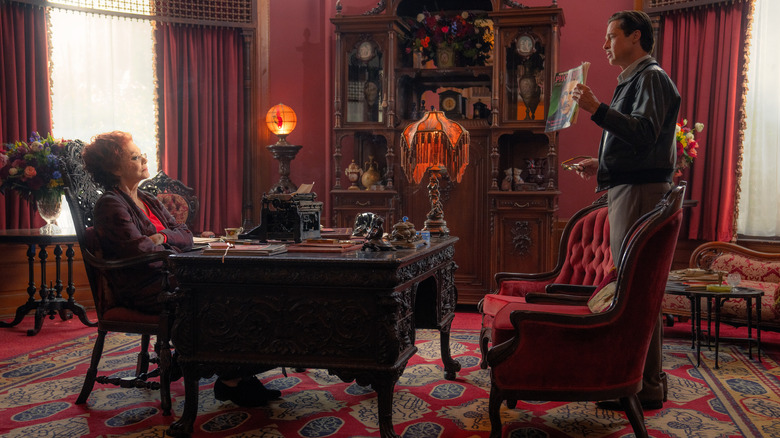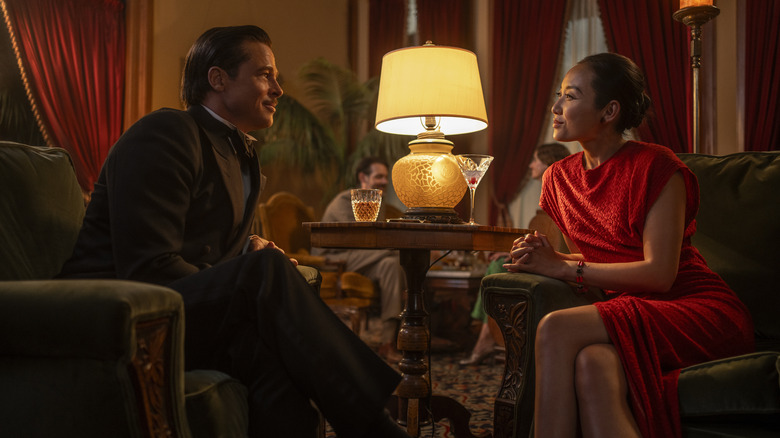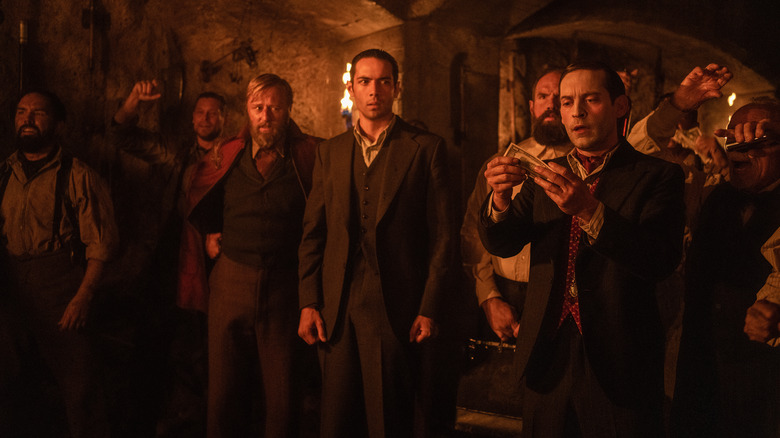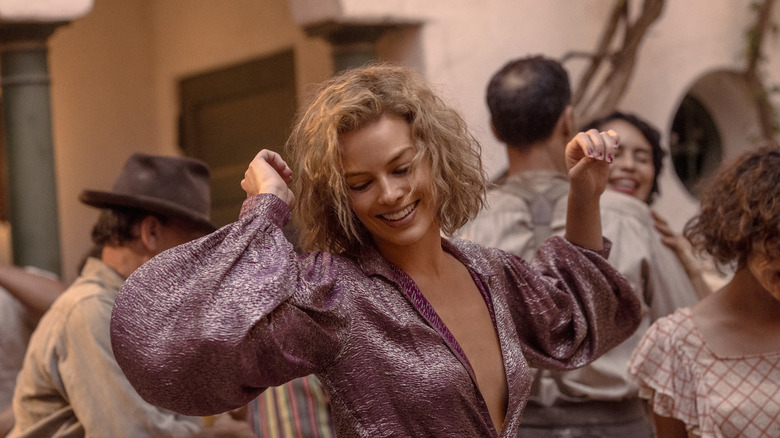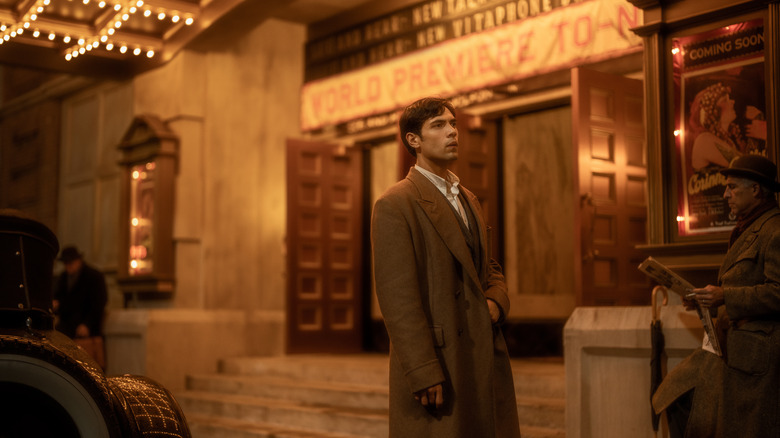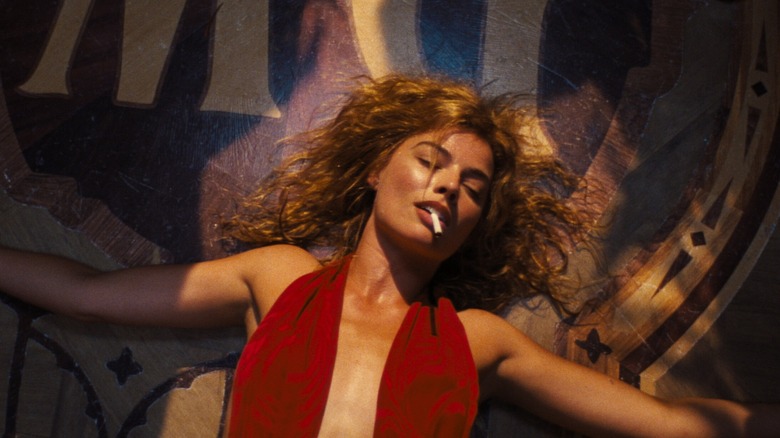The Ending Of Babylon Explained
Contains spoilers for "Babylon."
Damien Chazelle's latest film "Babylon" is the most ambitious entry in his filmography to date. Unlike the singularly driven "Whiplash" or the romantic two-hander "La La Land," "Babylon" is an expansive period piece set at the point in Hollywood's history when the age of silent cinema gave way to the introduction of sound. To best explore this era, Chazelle's script follows a diverse ensemble, each with their own individual, intermittently interconnected arcs.
The core players represent an array of figures at staggered rungs within the industry ecosystem in the latter half of the 1920s. There's Jack Conrad (Brad Pitt), a famous movie star; Nellie LaRoy (Margot Robbie), an up and coming starlet; and Manny Torres (Diego Calva), an outsider who becomes something of a social climber. At the margins of their core trifecta, there's also Sidney Palmer (Jovan Adepo), a jazz trumpeter who becomes a star in his own right, and Lady Fay Zhu (Li Jun Li), a multi-disciplined artist and performer whose sexuality keeps her in the shadows. Jean Smart's Elinor St. John, a sensationalist journalist, observes, documents, and aggrandizes their exploits.
During the day, these disparate artists sweat and bleed for the picture business, grinding out their elaborate make-believe worlds within the limiting technology of the time. But by night, their Dionysian excess matches (if not exceeds) the hard work that precedes it, with extravagantly decadent parties characterized as much by glamour as they are by debauchery and catastrophic indulgence. But when the advent of sound recording alters the very core of moviemaking forever, this magical way of life changes, and the film's epic final act finds some shocking and tragic conclusions for each of its most compelling characters.
The End of an Era
Past the midway point of the film's lengthy runtime, "Babylon" transforms into a well-stacked Jenga tower crumbling at a disturbingly frenetic pace. Jack sends Manny to the New York premiere of "The Jazz Singer" and the audience's reaction to watching a movie where no title cards are necessary and dialogue can be heard freely feels like a klaxon hailing the end times. It's time to adapt or get left behind.
Everything that made the individuals that we the audience have been following so uniquely gifted for making pictures turns into unfortunate weaknesses or quirks within the new studio production model. The film spends some time showing us the difference between the chaotic and unfettered structure of shooting silent cinema versus the new, hermetically sealed nature of recording sound under hot studio lights that air conditioning cannot cool because the fans would be too loud.
At first, the sequences highlighting all the adaptation required for this new paradigm are uproarious and entertaining, but the realities they present set everyone on different, often tragic courses.
The Party is over
One by one, each of our esteemed players begins to crumble in some way, shape or form in this new frontier. The fire and tenacity that made Nellie so alluring in silent films proves too grating for audiences averse to her Jersey girl accent and gauche attitude. Jack, a performer so capable of telegraphing emotion and intrigue through his eyes and his face, sounds goofy to a fault when delivering actual dialogue. But above all else, the morally permissive world everyone had grown accustomed to begins to shift as well. Gone are the elephant parades and graphic sex-laden parties of the film's first act. In their stead, a sanitized and socially stifling new environment forms for upper crust gatherings populated by monied elitists.
Manny seems to be the only one adaptable enough to roll with the punches, spearheading a rebrand for Nellie to make her more palatable in the sound era after he turns Sidney into a musical star through new movies aimed at Black audiences down south. But the biggest indicator that he will not be able to turn this around for her, as she struggles with financial issues, substance abuse, and gambling, arrives when her big re-debut at a stuffy dinner party implodes.
Nellie, with Elinor by her side, completely melts down, tossing her new posh accent in the trash along with any semblance of her manners, figuratively and literally telling the other guests to go fornicate with themselves.
Not dark enough...
Even Sidney, in his newfound stardom, discovers that there's a limit to the luster of his new life. In a pivotal moment, Sidney is filming a set piece for a new movie, but he is performing with a band comprised of artists darker skinned than he is. Under the intense studio lights, the black and white cameras cannot recognize his brown skin for what it is, and the producers are concerned that when they sell the picture to the audiences who have previously loved Sidney's work, it will look, to a layman, like a white man playing with a black band. Manny, ever the fixer, is brought in to convince Sidney to use burnt cork, most commonly used for blackface in minstrel shows, to fit in on celluloid with his co-stars.
Manny leverages the fact that if they can't complete and release the picture, none of the other musicians will be able to feed their respective families. Sidney does it, debasing himself, and when shooting is complete, he walks off of the studio lot, never to return. He makes his way back to the clubs and jazz joints of his past, where he may not be as famous, but he won't have to pervert his own art to stay a star.
Yesterday's news
After a couple of failed talkies, Jack agrees to do a feature story for Elinor, granting her an interview about what the future may hold. But when the magazine is released, the cover presents him as a washed up has-been and executives won't take his calls, leading him to confront her in her office. She seems preternaturally aware of where Jack's mind has been all week, referencing something we see that she wasn't privy to. Elinor asks Jack if he wants to know why audiences were laughing at him on screen in the showing he snuck into incognito.
Elinor proceeds to explain the sum total of her observed knowledge about the motion picture business, in a stirring monologue that Smart absolutely nails. She highlights the cyclical nature of stardom, the fleeting side of telling stories on the silver screen and the immortality that comes from being burned into celluloid. His time as a bankable star may be done, but whenever someone threads a film of his through a projector, no matter how far into the future, Jack Conrad will live again. And again.
This speech is central to Chazelle's thematic preoccupations with "Babylon," and although it's presented as soothsaying from an esteemed colleague, it feels like she's speaking directly to us all about the enduring truth of cinema — that it cannot be killed in a way that truly matters.
Last call
Seemingly resigned to his fate playing basic, unfulfilling roles in terrible movies as favors to the execs who no longer value him, Jack is enjoying a night out with some friends when he runs into Lady Faye, one of his last compatriots from a bygone era. In the earlier parts of the film, Lady Faye was an impressive live performer who was also gifted behind the scenes, helping to write title cards for movies. She formed a particular bond with Nellie, as one of the only script people who knew how to skew a story to Nellie's strengths. But one of Manny's many fixer duties was shooing Faye away from Nellie, as tabloids linking the two together romantically were a problem for his rebrand of her.
So Faye is taking her talents to Europe, where the various art scenes are thriving in comparison to the new staid placidity conquering Hollywood. In watching the two catch up, an old fire seems to light anew in Jack, as we see the same charisma and verve for the arts he displayed before his sad turn. For a few brief moments before he says goodbye to her, Jack feels alive again.
That is, until the camera dutifully follows him on the long walk back to his hotel room, where he walks into his bathroom and blows his brains out.
If you or anyone you know is having suicidal thoughts, please call the National Suicide Prevention Lifeline by dialing 988 or by calling 1-800-273-TALK (8255).
Desperate measures
Manny and Nellie are the last two dominoes left to fall. Since the two met in the earliest act of the film, it's been clear that Manny loves Nellie, perhaps more than she's capable of offering in return. Manny has made himself into a successful executive despite all the changes to the business, but his one weakness remains his devotion to a once-promising star who has fallen on extreme hard times. When Nellie arrives at Manny's doorstep begging for help because she's in too deep to some very dangerous people, he has no choice but to try to bail her out one last time.
Manny turns to The Count (Rory Scovel), a Hollywoodland jack of all trades who does various jobs on set, but is primarily a drug dealer. The Count is able to get the necessary money together and arrange a meeting with James McKay (Tobey Maguire), the crime boss to whom Nellie is in debt. Mirroring the drug deal gone bad from the final act of Paul Thomas Anderson's "Boogie Nights," McKay's eccentricities and dangerous connections create immediate suspense. The tension comes to a head when Manny finds out the money The Count has procured is prop money from the studio, a discovery revealed right as McKay is pitching them terrible movie ideas and forcing them to follow him and his co-horts to what he calls the last real party left in LA.
What follows is a harrowing and darkly comic descent into a multi-level, underground nightclub hidden beneath a tunnel. There are all manner of disquieting and disturbing acts being conducted in the murky background, but it's all presented as a dark twin to the film's earlier parties. When they finally reach the main attraction, it's a masked, Herculean man doing some very strange and uncomfortable things with mice. It is here that McKay discovers the money is fake, and Manny must make his narrow escape with The Count.
One last dance
Manny and The Count plan to run away to Mexico for safety, and Manny convinces Nellie to join him, as it's the only way they'll survive. While they wait for The Count to pack, the two share one final dance together at a wedding they crash while filling up the gas tank. It's a hypnotic and heartbreaking display of a life the two could have together as husband and wife, until it's poisoned by the sound of a false note. The trajectory we've been on through this final act makes it feel too portentous to come true.
When Manny runs into The Count's apartment to retrieve him, Nellie wanders off, singing and dancing to herself into the shadows, knowing what we knew the entire time — this particular love story wouldn't have a happy ending. To make matters worse, when Manny gets inside, one of McKay's men breaks into the apartment and kills The Count, but spares Manny's life as he tearfully begs for his life. He's set free under the provision that he stays out of LA, running off to Mexico to begin a new life.
Coming Home Again
It's 1952 and Manny returns to LA, with his wife and their child. They take a look at the doors to the studio he once worked for, and he makes small talk with the Hispanic security guard about how he used to help make movies on the other side of that gate. His family chooses to go back to their hotel, but Manny continues walking the streets, riddled with nostalgia for the life he left behind. He wanders into a theater playing "Singin' in the Rain," a movie that has an important connection to "Babylon," as it covers much the same timespan. Now it's not just sound, but color up on that big screen, and it's a dramatized version of events that mirror those he and his friends survived.
Well, some of them survived. A montage shows the final fates of the rest of our cast — that Nellie died as she lived, to excess, and that Elinor has also passed. But we stay with Manny and the intense emotional reaction he's having to this film, and to the shots of the audience, diverse and enamored by what they see. The film explodes into a montage of the films that would come after, and after, literally moving all the way up through the future of movie history to "Avatar."
Manny may have had to leave the movies behind, but they're always going to be there for him, and the rest of us as well.
The Dying Light
Like many filmmakers post-Covid, Chazelle seems to be preoccupied with the ever-changing nature of the movie business, and the sense that what it once was may never be again. But through "Babylon," he's able to reassert that this constant change is a feature, not a bug. The end of the silent era was not the end of the movies, nor would it be the end of people thinking something was going to be the end of movies. Though this finale may prove ambitious to a fault for some viewers, and its galaxy brained optimism may border on parody, it is a deeply reassuring and nourishing note to end such a chaotic and at times arduous film on.
Technology may change. Society may progress. But we will always want to tell stories. Many of them look best up on that big, shining screen.
